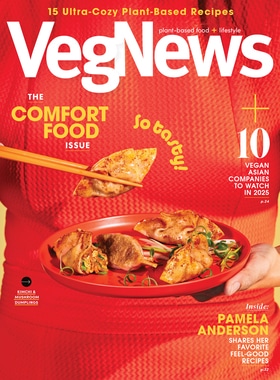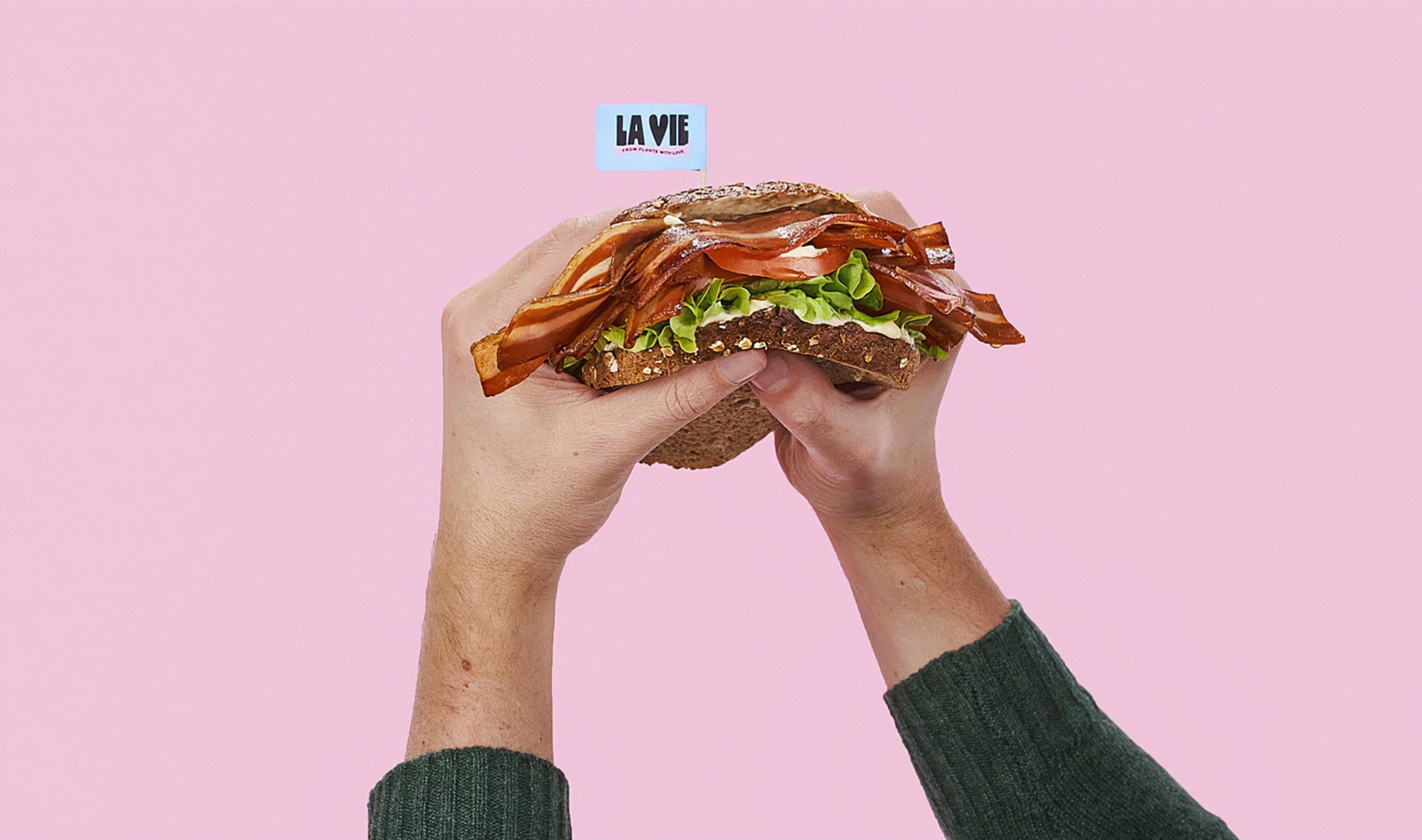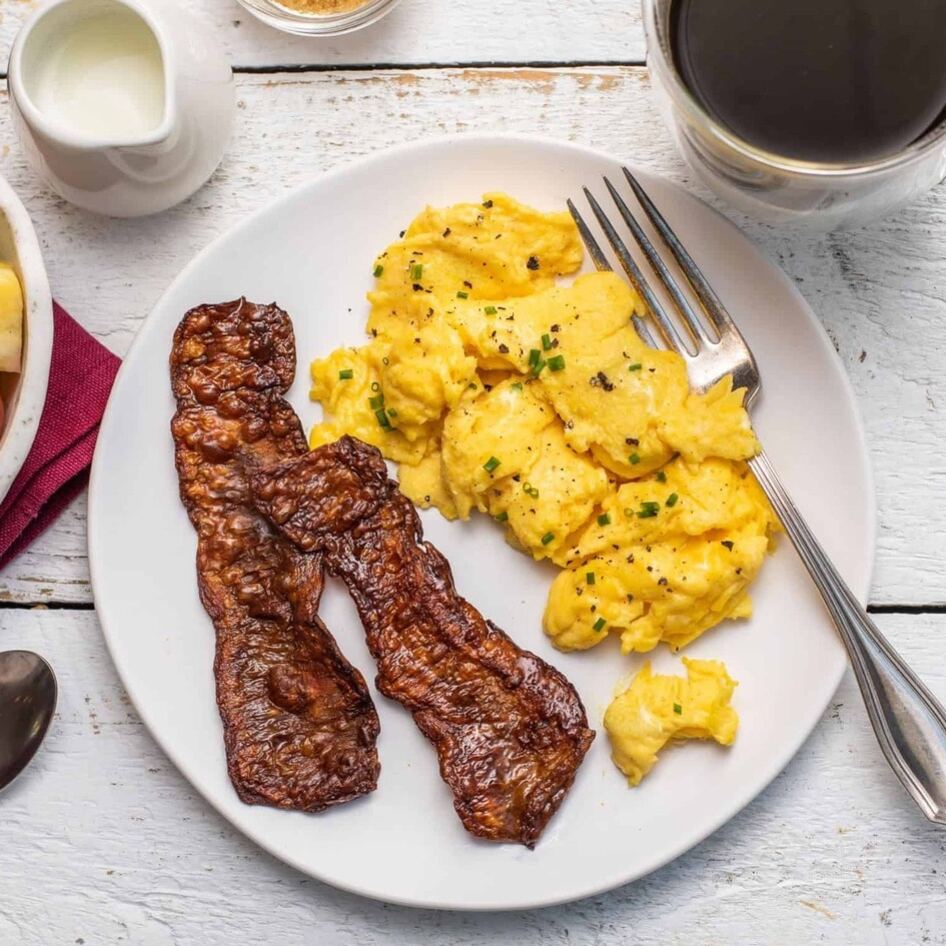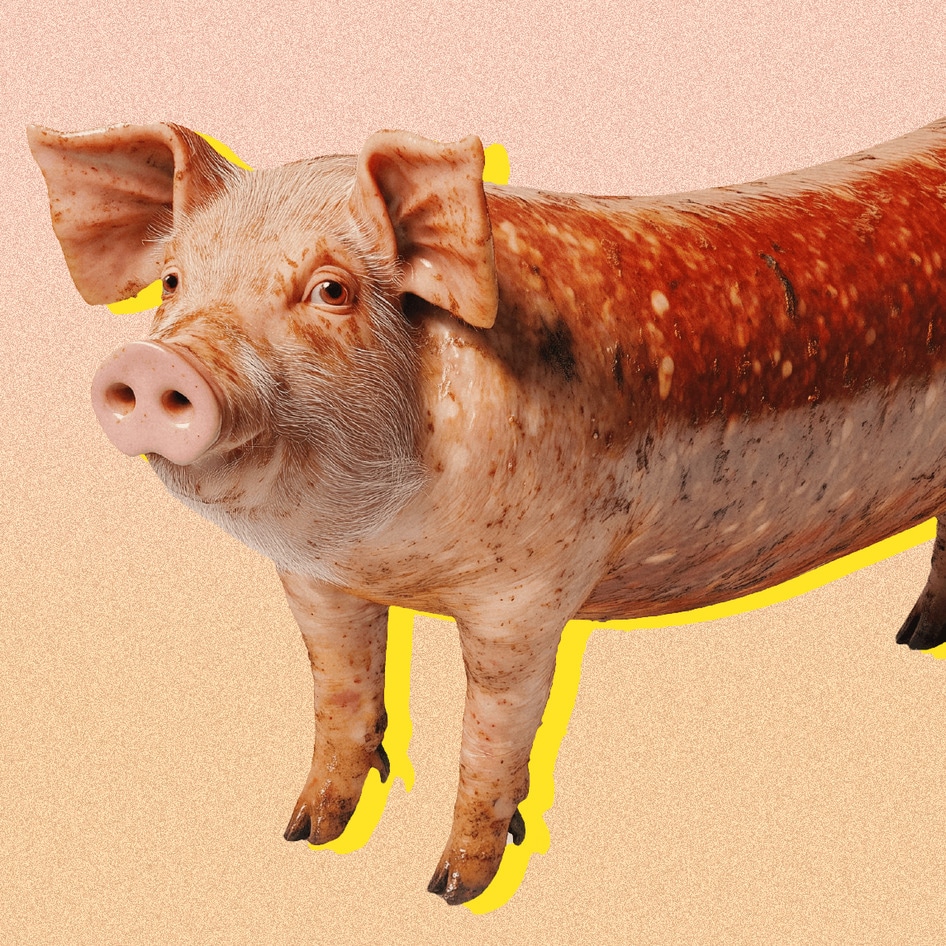For vegans, animal-derived bacon is off the table. The same is true for people who follow various faiths in which dietary laws prohibit the consumption of pork. But what about vegan bacon?
Though nuances of each religion differ, Imams and Rabbis alike can cite holy text that guides followers to provide food for those less fortunate, recite blessings before meals, and observe dietary laws as a means to be close to, and follow the words of, the ones they worship.
Food, then, has the power to unite, bridging massive gaps in perceived ideological differences. As the Natalie Portman-backed French brand La Vie can attest, a combination of humor and vegan ethics has potential to unite people at the intersection of religion and plant-based eating.
 La Vie
La Vie
“A Jew, a meat-lover, a Muslim and a vegan walk into a bar and share a bacon sandwich,” isn’t the mere setup of a cheeky joke; rather, it’s the basis for La Vie’s latest campaign to promote its product, voted “best plant-based bacon in the UK”.
“Now that we can have all the pleasure of pork, without the pig, we can finally start gathering at the table people from all diets, beliefs, and religions,” Romain Jolivet, Chief Marketing & Creative Officer at La Vie, tells VegNews.
“The pig that has historically been a symbol of division, suddenly becomes a symbol of gathering. This is one of the yet-untold beauties of indulgent vegan food: gathering, instead of dividing.”
Is vegan pork kosher and halal?
La Vie is in the process of exploring Kosher and Halal certifications, though the anthocyanins (used as a colorant in its plant-based bacon) are Kosher.
La Vie’s take on pigless bacon joins a growing list of bacon, pork, or sausage alternatives suitable for some Jewish and Muslim vegans. For instance, Impossible’s sausage links are Halal- and Kosher-certified, while OmniPork is Halal-certified (but has yet to seek Kosher certification).
“Being that food is such a huge part of the human experience, I find a lot of inspiration and meaning in the ways that dietary laws of various faiths overlap and intersect,” Rabbi Akiva Gersh, also known as the Vegan Rabbi and Masterclass teacher on Judaism, Animal Welfare and Veganism, tells VegNews. “Highlighting this can help us rise above the differences between us and help us focus more on what we have in common with one another.”
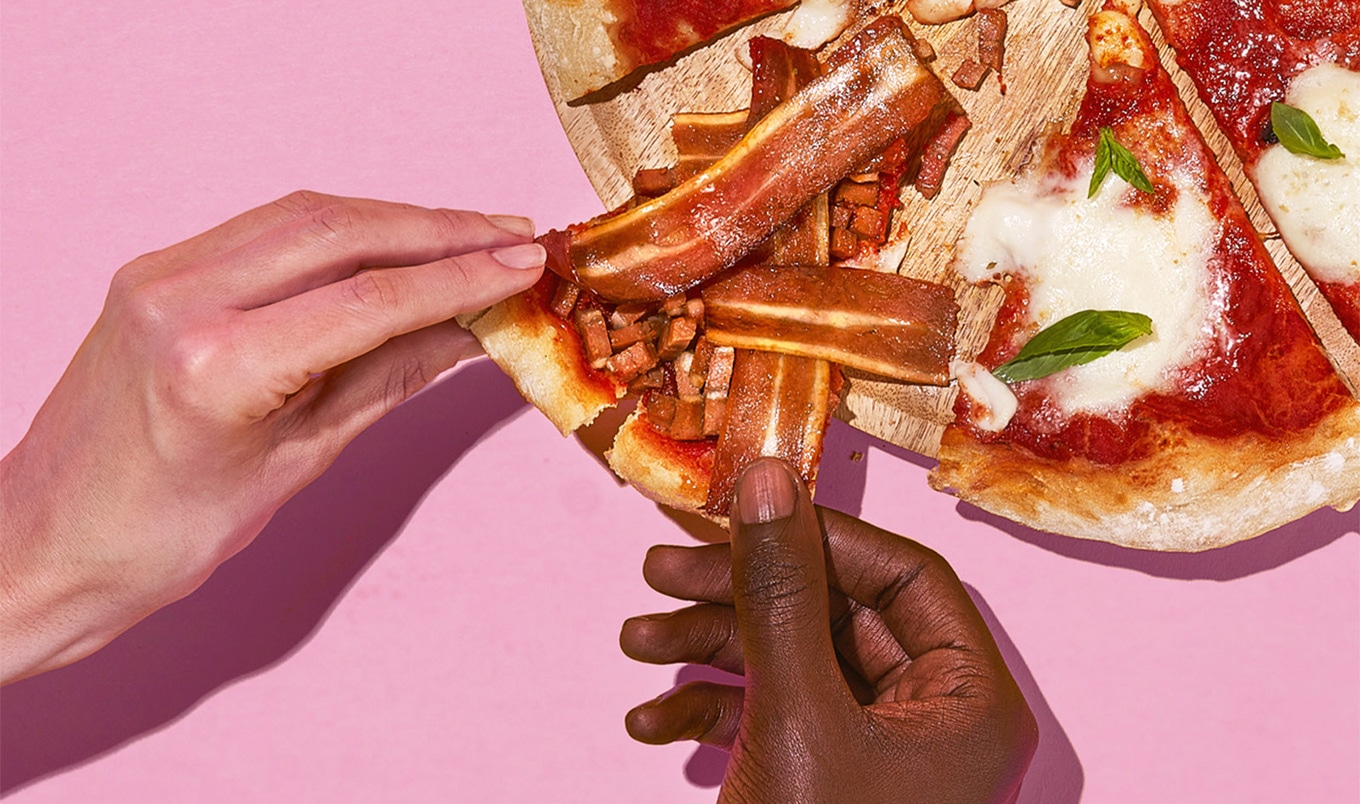 La Vie
La Vie
“I do also believe that plant-based meat and dairy alternatives can aid in uniting us since many of our food customs and laws end up keeping us in our own separate communities,” the rabbi says. “Being able to participate in more meals together can help to create more space for discussion and dialogue, which can lead to greater understanding and respect across cultural and religious divides.”
Plant-based options to bridge cultural differences
Faraz Harsini, PhD, is an expert in chemical engineering, nanobiotechnology, cell physiology, molecular biophysics, cancer research, and infectious diseases. Founder and CEO of Allied Scholars for Animal Protection, Harsini is a prolific academic and animal welfare advocate, who reconciled his identities as an LGBTQIA+ Iranian immigrant and human rights advocate.
He once wrestled with the dilemma of his dietary choices being “complicit in and supportive of violence” and says La Vie’s campaign resonates with him.
“What I learned is that when we focus on our differences rather than our similarities, we lose one of our greatest qualities: empathy,” Harsini tells VegNews. “Without emotional connection to others, it becomes easy to ignore their suffering and even justify causing them harm.”
 La Vie
La Vie
Deftly relating the liberation of his identity as a gay man to the acknowledgement that all beings share the capacity to suffer and the desire to be free from harm, Harsini’s support of a plant-based diet and providing such options to those of all religious faiths is rooted in health and academic research, justice, religion, and identity.
“Adopting a vegan lifestyle is an extension of the same logic and moral principles applied to other marginalized groups. We recognize that nonhuman animals are different from us, but we also acknowledge that in all the ways that matter, we are similar,” Harsini says. “Historically, whenever our species has focused on differences—whether it be religion, race, sexual orientation, or species—we have inflicted immense suffering on one another and on other animals, and have justified it with ease.”
“Today, we are ashamed of many of the atrocities committed in the past, and I believe that in the future, we will similarly look back on our exploitation of animals with shame and regret,” Harsini says.
A disruptive campaign like La Vie’s is necessary for change on a global scale. Gersh and Harsini are aligned in their beliefs that a core religious value, compassion for all beings, is exemplified through a vegan diet.
“Regardless of our religious beliefs, dietary choices, or species, when we are stabbed, we all feel pain, we all bleed the same,” Harsini says. “This shared vulnerability and capacity to experience pain and suffering is a reminder of our similarities and should guide our actions towards empathy and compassion towards all living beings.”
Veganism and religion in the modern world
Gersh adopted a vegan lifestyle in 1995, prior to the proliferation of plant-based products such as La Vie’s vegan bacon or Impossible’s pork sausage. However, he believes these innovations can aid in the transition for those working towards a plant-based diet.
For others seeking religious justification for such a lifestyle, he cites teachings directly from the Torah. God’s original diet to humanity was a plant-based one, Gersh says, citing Genesis 1:29, and Judaism places great importance and obligation to show compassion towards animals.
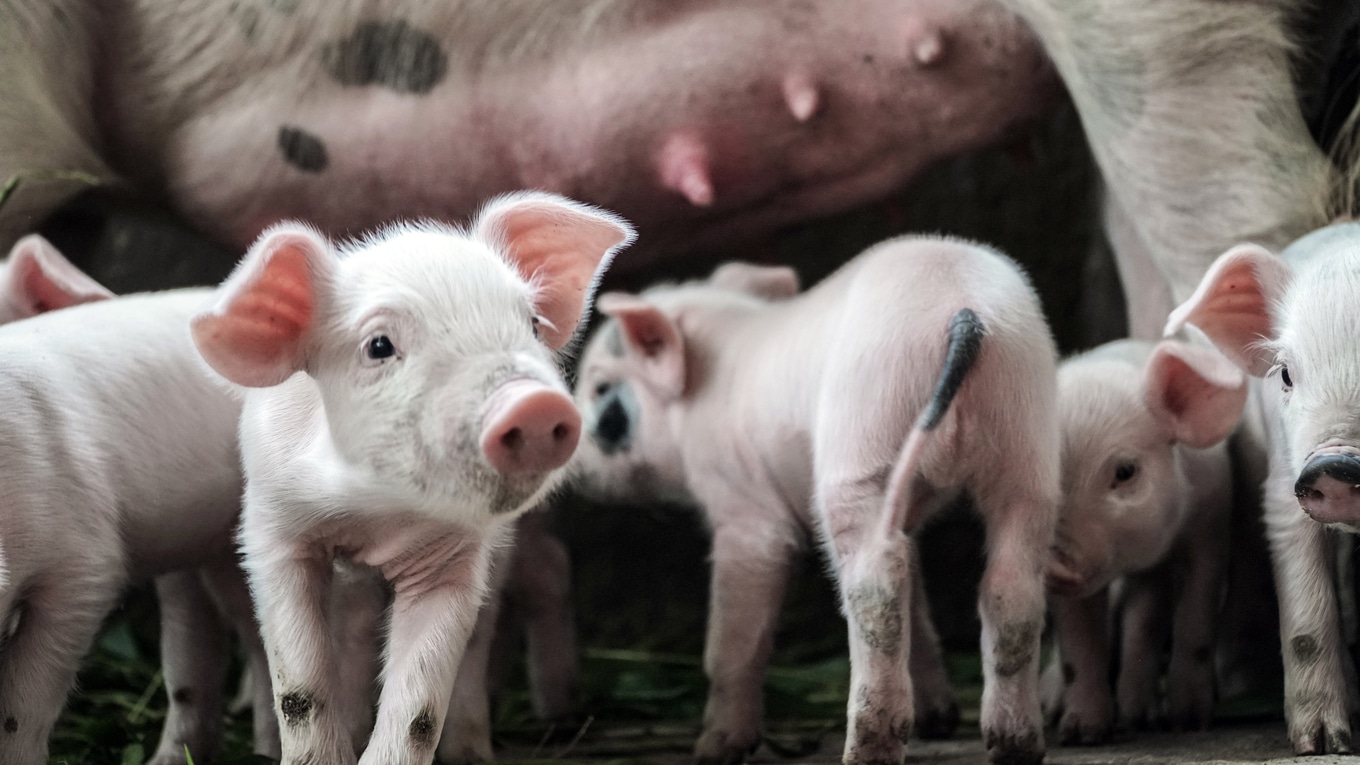
Unsplash
“A major value in Judaism is tikkun olam, which is the idea that each one of us is here to participate in the fixing of the world. Judaism encourages us to be aware and conscious of the impact and consequences of our everyday actions,” he says. “Because our food choices have such a far-reaching and serious impact on the world—on the animals, on the planet, and on human health—a vegan diet seems to be the best way to ensure that we are eating in a way that reflects the values of compassion, care and concern for all forms of life in God’s world, as well as distances us from participating in cruelty towards animals and the destruction of the environment.”
“In short, going vegan seems to me to be one of the best ways that we can participate in tikkun olam,” Gersh says.
Harsini agrees with Gersh that, in the modern world, choosing a plant-based diet, vegan bacon and all, aligns with religion-based dietary restrictions.
“No religion mandates eating animals or hurting them. While animal consumption may have been a necessity hundreds and thousands of years ago, we have no need to kill animals for their flesh today,” Harsini says. “If religion is a way to truth, love, and peace, how does slaughtering an animal for its flesh lead me towards love and peace?”
For the latest vegan news, read:
JUMP TO ... Latest News | Recipes | Guides | Health | Subscribe
